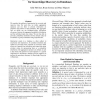Free Online Productivity Tools
i2Speak
i2Symbol
i2OCR
iTex2Img
iWeb2Print
iWeb2Shot
i2Type
iPdf2Split
iPdf2Merge
i2Bopomofo
i2Arabic
i2Style
i2Image
i2PDF
iLatex2Rtf
Sci2ools
117
click to vote
KDD
1998
ACM
1998
ACM
Aggregation of Imprecise and Uncertain Information for Knowledge Discovery in Databases
We consider the problem of aggregation for uncertain and imprecise data. For such data, we define aggregation operators and use them to provide information on properties and patterns of data attributes. The aggregates that we define use the Kullback-Leibler information divergence between the aggregated probability distribution and the individual tuple data values. We are thus able to provide a probability distribution for the domain values of an attribute or group of attributes using imperfect data. Information stored in a database is often subject to uncertainty and imprecision. An extended relational data model has previously been proposed for such data which allows us to quantify our uncertainty and imprecision about attribute values by representing them as a probability distribution. Our aggregation operators are defined on such a data model. The provision of such operators is a central requirement in furnishing a database with the capability to perform the operations necessary fo...
Related Content
| Added | 06 Aug 2010 |
| Updated | 06 Aug 2010 |
| Type | Conference |
| Year | 1998 |
| Where | KDD |
| Authors | Sally I. McClean, Bryan W. Scotney, Mary Shapcott |
Comments (0)

